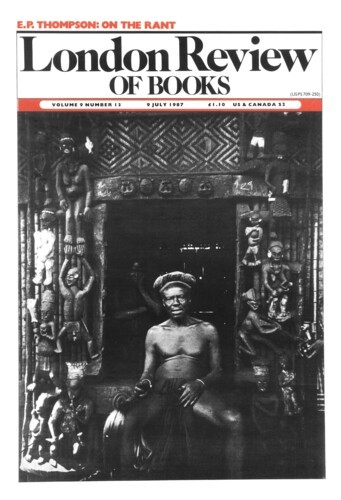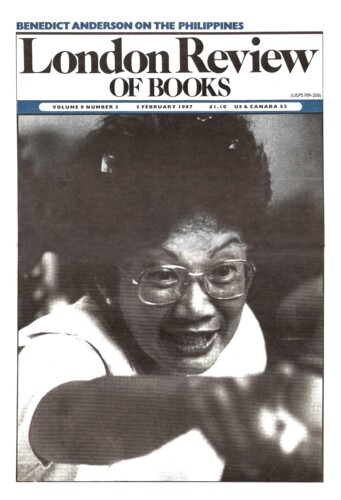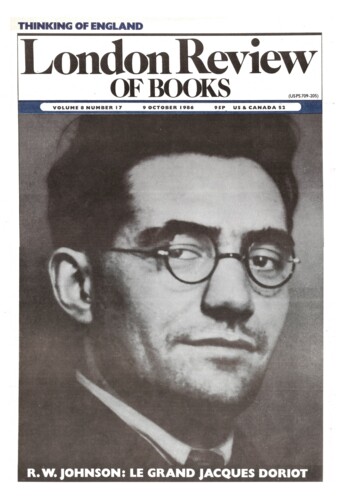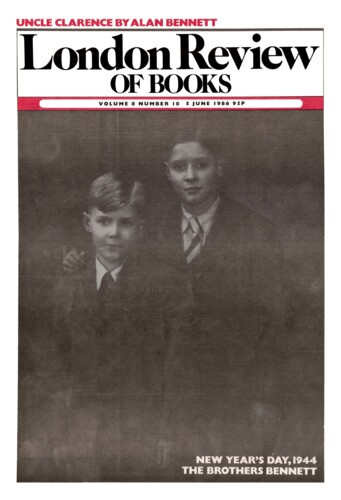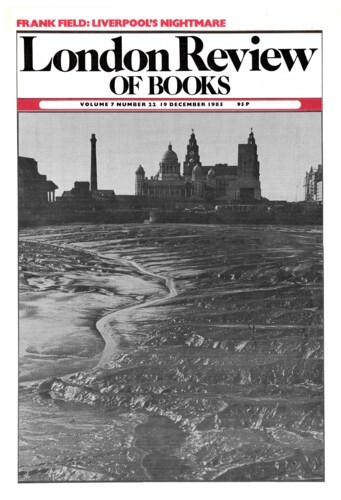Danny Karlin
Danny Karlin, an emeritus professor of English at the University of Bristol, is the author of Browning’s Hatreds and the editor of The Penguin Book of Victorian Verse.
It ain’t him, babe
Danny Karlin, 5 February 1987
Portraits require sitters. Portraits of the famous, which often seem designed for target practice, require the sitters to be sitting ducks as well. But Bob Dylan can’t stand sitting. Try playing chess with him: ‘His knees bounce up against the table so much you think you are at a séance. The pieces keep jumping around the board. But he beats me every time.’ (Dave Van Ronk said that.) That must be how every interviewer feels – except, it seems, Robert Shelton. It’s 1966: Dylan is talking to Shelton, whose book about him he has agreed to countenance, if not to ‘authorise’. He says something about his relationship with Joan Baez, and then asks:’
Danny Karlin comments on Edith Story’s story
Danny Karlin, 9 October 1986
To his closest friends, after Elizabeth Barrett’s death, Browning repeatedly spoke of the present as a country of exile. He wrote to Isa Blagden in July 1867 of taking ‘the three loveliest women in London’ to hear the Russian pianist Anton Rubinstein (who ‘played divinely’):
Facing West from California’s shores
Danny Karlin, 5 June 1986
Lee Van Cleef! I remember him in A Fistful of Dollars, where he had the respectable native occupation of bounty hunter, and a gun (with a natty set of attachments) which came in a flap-down case. Now he is ‘starring’ in a late-night series (Mondays on Central) so awful that the TV Times is ashamed to give any programme details except its title. It’s called The Master, and Mr Van Cleef plays a ninja warrior – an adept of the black Japanese arts of espionage and assassination – who tours America righting wrongs in the company of a fresh-faced American side-kid. Here, too, Mr Van Cleef is kitted out with deadly accessories – not firearms, but ninja weapons, from sword to spiked throwing wheels (for narrowly missing people and burying in door jambs), plus of course his feet and hands. The first sight of the game old boy dealing with a roomful of rednecks in bionic slow motion made me rub my eyes. But no. Spitting Image is on the night before.’
Post-War Memories
Danny Karlin, 19 December 1985
In my first year as a graduate student, I lived in a terrace house in York Street, Cambridge – a shabby, friendly part of town which had not yet been ‘improved’. (True, the previous owners had built an ‘extension’, but it was very ramshackle, and they left the main drain in the middle of the kitchen floor.) One of my next-door neighbours was Mrs A., a bent, frail, spirited woman, about seventy years old. Her house was heated by coal and lit by gas, because when she and her husband came back after World War Two, the landlord told them the whole street was going to be demolished in six months and it wasn’t worth putting in electricity. And after her husband died she could never be bothered.’
Pieces about Danny Karlin in the LRB
Ventriloquism: Dear Old Khayyám
Marina Warner, 9 April 2009
Edward FitzGerald transfused his own life, even as he deemed it a paltry thing, into the persona of Omar Khayyám, who would lift it from that paltriness and transfigure him. He was able to formulate through...
Provincialism: Karlin’s collection of Victorian verse
Denis Donoghue, 4 June 1998
I’ve been comparing Daniel Karlin’s anthology here and there with other anthologies of English verse of the same period (Victoria’s reign 1837-1901) and of the 19th century as a...
When in Rom
John Sutherland, 9 June 1994
Ask what has been the single greatest influence on literary research since the Sixties and the answer might be the Xerox machine, the jumbo jet or Jacques Derrida. Ask what will transform...
Browning and Modernism
Donald Davie, 10 October 1991
Browning is in high favour once again, or promises to be. Has not A.S. Byatt, CBE, declared him ‘one of the very greatest English poets’? In a switch to fighting talk, she adds that...
Read anywhere with the London Review of Books app, available now from the App Store for Apple devices, Google Play for Android devices and Amazon for your Kindle Fire.
Sign up to our newsletter
For highlights from the latest issue, our archive and the blog, as well as news, events and exclusive promotions.
